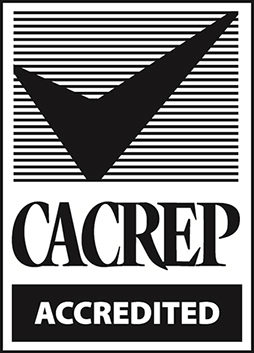
Accredited by CACREP
Our counselor education programs are accredited by the Council for Accreditation of Counseling and Related Educational Programs.
As a professional counselor, you will help and support individuals, couples, families and groups in school and community settings. Doctoral graduates conduct research, teaching, and provide supervision to advance the counseling profession.
If you are seeking to become a counselor, the Ed.S. in Counselor Education is the degree for you.
For licensure purposes, the Ed.S. degree is essentially the same as a master’s degree. Because the Council for Accreditation of Counseling and Related Educational Programs (CACREP) requires a minimum of 60 hours at the graduate level, we award students an Ed.S., which better reflects the number of credit hours required to achieve the graduate degree in counseling.
The program is a full-time fall, spring, summer cohort model that typically takes two years to complete. The Ed.S. in Counselor Education is offered in three concentrations:
The Ph.D. in Counselor Education will prepare you to become a counselor educator, supervisor, or researcher in an academic setting.
The students and faculty of the Counselor Education Programs in the Department of Educational and Developmental Science in the College of Education at the University of South Carolina are a diverse community of learners collaboratively engaged in scholarship, leadership, service, and advocacy for systemic change. The mission of the Counselor Education Programs is to prepare multiculturally competent counselor educators, clinical mental health counselors, marriage, couples, and family counselors, and K-12 school counselors. Graduates will demonstrate leadership, skill, knowledge, and character that are reflective of the standards set forth by the counseling profession and their areas of specialization. Students and faculty of the Counselor Education Programs are expected to exemplify the highest ethical and professional standards while engaged in accomplishing this mission.
The Ed.S. degree programs in School Counseling and Marriage, Couples and Family Counseling are nationally accredited by the Council for Accreditation of Counseling and Related Education Programs. Graduates of these programs have gone on to succeed in a variety of counseling positions. The Ph.D. program has also earned accreditation; its graduates can be found as faculty in counselor education programs in colleges and universities across the nation.
The new Ed.S. degree in Clinical Mental Health is preparing for the accreditation review process. As part of our ongoing commitment to exceeding standards, we encourage you to view our most recent Systematic Program Evaluation Summary.
We would also like to invite you to join the conversation on Facebook to see how other counselors are feeling about issues specific to the profession as
well as achievements and opportunities in our professional community.
The University of South Carolina and the College of Education are committed to multiculturalism,
and the Counselor Education program actively promotes diversity within a social justice
framework to foster a climate of respect for one another. Your fellow students, along
with the program faculty form a diverse community of learners who are collaboratively
engaged in scholarship, leadership, service, and advocacy for systemic change. Your
course work will help you develop the knowledge, skills and dispositions that epitomize
excellence in counseling.
After completing an Educational Specialist degree, you might work in private practice, for a community agency, university counseling center, or K-12 school. Doctoral graduates work in institutions of higher education throughout the United States conducting research and training future counselors.
The Minor in Counseling can open many doors by giving you a solid foundation of the
helping professions- psychology, social work, and criminal justice among many others.
The Career Development Facilitator Certificate gives you the knowledge to guide others
in making their own career choices as a career counselor.

Our counselor education programs are accredited by the Council for Accreditation of Counseling and Related Educational Programs.